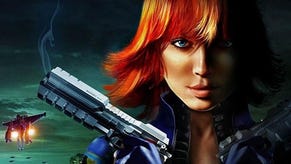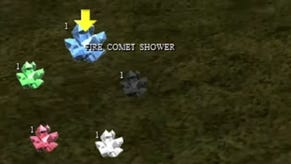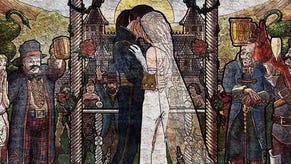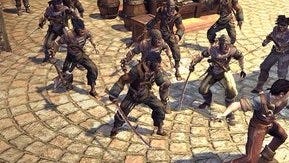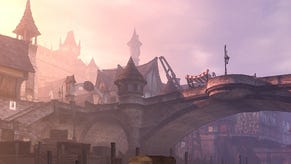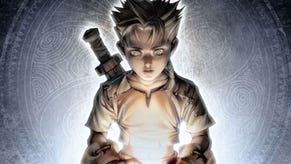Fable
Save the world. Also, philander.
Fable is, essentially, about being a Hero (or rather, a figure in Heroic Fantasy, removing the necessarily positive connotations of the word "hero", since the option to be King Shit is very much open). Starting in childhood, you rapidly progress through your training in a guild before being released into a standard, if cleverly and gloriously skewed, fantasy land to find your destiny and save the world or something. This involves standard RPG mechanics of taking quests - accepted from the Hero guild itself - and so earning gold and spending experience points across the available skillsets (Strength, Skill and magic related ones, basically, with the player being able to pick and choose which areas interest them, getting experience both for sole spending in each based on how much they use each, as well as general experience to be assigned to anything they fancy). As you complete missions, you open up more of the map which you can then explore using teleporters as blessed shortcuts.
However, where Fable tries harder is its setting, which features a more extensive attempt to model a living world which responds to your actions than we've seen in an Action RPG. In other words, you have an external life. Get married. Get divorced. Get your hair cut. Age. Flirt. Sneer. Laugh. Break laws. Break wind. Buy property. Influences from the Sims and GTA are pretty clearly evident.
While if you approach it with the years of hype in mind you're sure to quibble, Fable actually goes further than any game ever to put you in those over-sized boots that bestride the earth. So depending on your successes and failings on quests, people will respond appropriately. As your reputation grows, you're cheered as you pass, women grow faint and... well, life becomes a ticker-tape parade. You can draw lines to City of Heroes' recent highly-atmospheric superficial additions of civilians congratulating you, but here it's even more effective as it's only you who are receiving this blessed attention. No, you don't literally age from birth to death as was described earlier in the Project Ego genesis of the game, and those expecting the wide-open spaces of Morrowind are going to be sorely disappointed by the interconnecting corridors which make up its world, but in terms of what it does model, Fable generally succeeds in its quests.
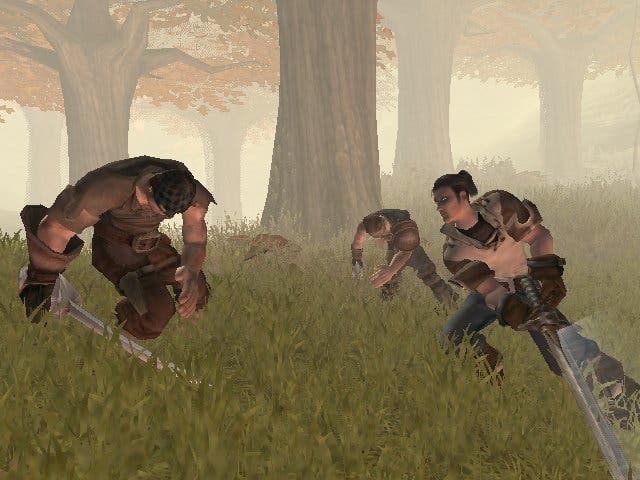
It fumbles its sword more when the player's fumbling his sword (that pro-noun reveals another fault: no option for a female lead). The amount of equipment and options available is pretty hefty, requiring a fairly elaborate control system that does lack elegance. Digging something out of the depths of your inventory can really feel like rooting through a backpack, which isn't exactly fun and can lead to mistakedly using objects in the midst of battle. While combat against small numbers mostly operates well, as the mobs increase things become more fuzzy. The lock-on target system creates moments of screaming when it flips you to face the opposite direction to an attack. Even worse, when it decides that you actually were interested in targeting a friendly despite being knee-deep in some vile lycanthrope-sorts. The camera also starts to fall apart in these intense situations, and wasn't exactly being world-class in the first place. Niggles abound - for example, if you're being followed by a henchman sort, an icon floats above their head. If they're jogging behind you, the icon has a terrible tendency to obscure the entire screen. Man!
However, it should be stressed that even if we removed all of Fable's unique positive qualities, and left it as a straight Action RPG it'd still be a perfectly passable example of its genre. This isn't a surface over content thing. Or, at least, purely surface over context.
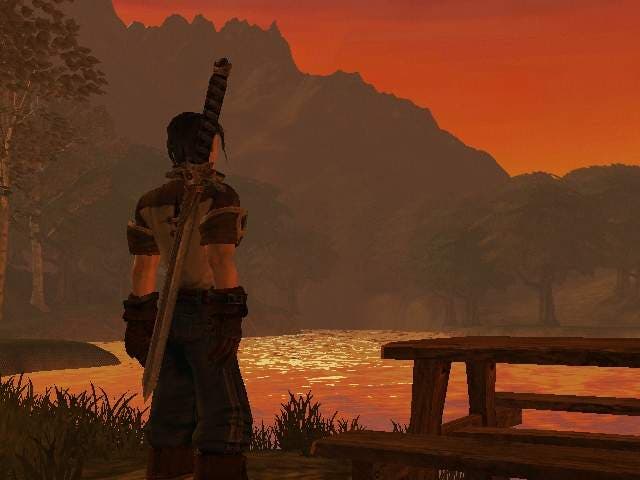
Plot-wise, well... China Mieville won't be cribbing notes. Clichéd fantasy of the boylostfamilypowermysteriouslineage type abounds... However, Fable manages with considerable panache to transcend these base ingredients. Rather than being po-faced or twee, it keeps it light. While stopping short of open Pratchett-esque parody, its tongue is very much kept in cheek. It's gloriously, idiosyncratically British. The voice cast are gathered, virtually exclusively, from north of the Watford gap, with Brum and Scouse tones clashing into each other, and shouted exchanges between philandering villagers reminding you of out-takes from Coronation Street. Hell - it's so British that when stripped off, the lead character has Union Jack underpants. If the fairy-boy-isms of Zelda always made it difficult for you to love Ocarina of Time as much as you know you should, then Fable's adult-but-not-too-adult stance is a blessed relief.
So Fable is, essentially, a Christmas Tree of a game. It uses the solid Action RPG as a frame to hand every random, glorious, playful bauble Lionhead and Big Blue Box could construct off. It'll certainly gain the ire of the sort of person who furiously states that the vast majority of the decisions don't "matter" in games like Knights of the Old Republic or Deus Ex. For those of us who understand that while true non-linear storytelling is never going to happen, personalising a linear narrative in meaningful ways according to your own inclinations is far from inconsequential, then it's another significant step into the future.



